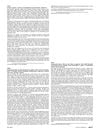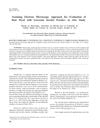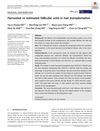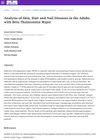 April 2023 in “Journal of Investigative Dermatology”
April 2023 in “Journal of Investigative Dermatology” SOX2 helps reduce wound size and pressure ulcer formation by suppressing oxidative stress and increasing antioxidant activity in mice.
 April 2023 in “Tikrit journal of pharmaceutical sciences”
April 2023 in “Tikrit journal of pharmaceutical sciences” Ginger extract helps hair growth and reduces the need for prednisolone in alopecia areata patients.
 September 2022 in “International Journal of Health Sciences (IJHS)”
September 2022 in “International Journal of Health Sciences (IJHS)” Low zinc levels may contribute to hair loss due to increased oxidative DNA damage.
78 citations,
August 2014 in “Anais Brasileiros de Dermatologia” New vitiligo treatments focus on controlling immune damage and restoring skin color.
 7 citations,
December 2018 in “Journal of Cosmetic Dermatology”
7 citations,
December 2018 in “Journal of Cosmetic Dermatology” Eating vegetarian, having allergies, and family history might be linked to getting gray hair early.
 July 2022 in “The journal of investigative dermatology/Journal of investigative dermatology”
July 2022 in “The journal of investigative dermatology/Journal of investigative dermatology” Targeting impaired Nrf2 signaling might help treat hidradenitis suppurativa early on.
 August 2022 in “The journal of investigative dermatology/Journal of investigative dermatology”
August 2022 in “The journal of investigative dermatology/Journal of investigative dermatology” Increasing type 17 collagen reduces aging signs in skin cells caused by UV light.
 January 2024 in “Journal of dermatology and skin science”
January 2024 in “Journal of dermatology and skin science” Topical aprepitant reduces skin rash and hair loss caused by cancer treatment.
 January 2024 in “Deleted Journal”
January 2024 in “Deleted Journal” Essential oils like lavender, chamomile, and bergamot help manage stress and improve well-being.
 July 2023 in “Health science reports”
July 2023 in “Health science reports” Alopecia Areata is linked to a higher risk of several diseases, which vary with age and sex.
 11 citations,
November 2021 in “Clinical, Cosmetic and Investigational Dermatology”
11 citations,
November 2021 in “Clinical, Cosmetic and Investigational Dermatology” Resveratrol may help hair grow, but more research is needed.
19 citations,
June 2022 in “Molecular therapy. Nucleic acids” A specific RNA, circNlgn, contributes to heart damage and scarring caused by the cancer drug doxorubicin.
 January 2024 in “Biological Research”
January 2024 in “Biological Research” Tiny particles from stem cells can help protect ear cells from antibiotic damage by helping cells remove damaged parts.
 April 2016 in “Journal of The American Academy of Dermatology”
April 2016 in “Journal of The American Academy of Dermatology” Ixekizumab is effective and safe for patients who did not improve with etanercept treatment for psoriasis.
 8 citations,
November 2019 in “International Journal of Morphology”
8 citations,
November 2019 in “International Journal of Morphology” Henna dye improves hair cuticle and thickness but effects vary by hair type and health.
4 citations,
October 2021 in “International Journal of Cosmetic Science” Cirsium japonicum flower extract increases melanin production and could help treat depigmentation conditions.
 October 2012 in “Medical Hypotheses”
October 2012 in “Medical Hypotheses” Artemis dysfunction might cause hair loss through telomere shortening.
June 2023 in “Clinical Cosmetic and Investigational Dermatology” The new technique effectively treats hairline vitiligo with repigmentation and hair regrowth.
 February 2020 in “International research journal of pharmacy”
February 2020 in “International research journal of pharmacy” The emulsion made from tea plant and onion extracts shows promise for treating hair loss.

The serum effectively promotes hair growth and reduces gray hair without side effects.
 1 citations,
December 2022 in “̒Ulūm-i dārūyī”
1 citations,
December 2022 in “̒Ulūm-i dārūyī” The new wound dressing with minoxidil and dexamethasone could speed up healing and reduce scarring in rats.
 January 2024 in “Frontiers in endocrinology”
January 2024 in “Frontiers in endocrinology” Treating early puberty with hormone therapy may increase the risk of polycystic ovary syndrome in adults.
 4 citations,
August 2018 in “Journal of Cosmetic Dermatology”
4 citations,
August 2018 in “Journal of Cosmetic Dermatology” Actual harvested hair follicles were fewer and differed in type from estimated, with older patients and those with multiple transplants needing more careful planning.
 12 citations,
June 2018 in “Journal of Cosmetic Dermatology”
12 citations,
June 2018 in “Journal of Cosmetic Dermatology” PRP is effective for hair loss and might work better with other treatments, but more research is needed.
 19 citations,
July 2018 in “Mechanisms of Ageing and Development”
19 citations,
July 2018 in “Mechanisms of Ageing and Development” Eating less can slow aging and help keep stem cells healthy by cleaning out damaged cell parts.
 March 2018 in “Gazi medical journal”
March 2018 in “Gazi medical journal” Adults with Beta Thalassemia Major are more likely to have skin, hair, and nail disorders.
 1 citations,
January 2023 in “Burns and trauma”
1 citations,
January 2023 in “Burns and trauma” Tiny particles from 3D-grown skin cells speed up wound healing by promoting blood vessel growth.
 25 citations,
January 2002 in “Folia Pharmacologica Japonica”
25 citations,
January 2002 in “Folia Pharmacologica Japonica” Minoxidil helps hair grow by improving blood flow and increasing growth factors in hair follicles.
 10 citations,
May 2020 in “Journal of proteome research”
10 citations,
May 2020 in “Journal of proteome research” Explosions don't stop hair proteins from being used to identify people.
 6 citations,
August 2019 in “PLOS ONE”
6 citations,
August 2019 in “PLOS ONE” Gambogic Amide helps maintain hair color and promotes hair growth.

























